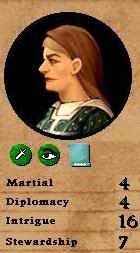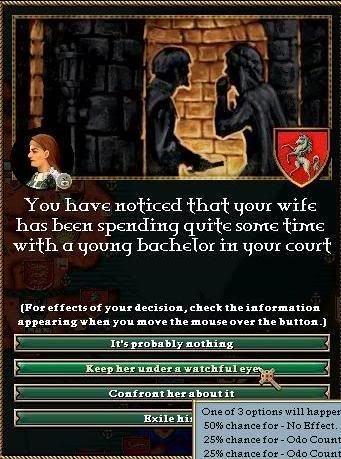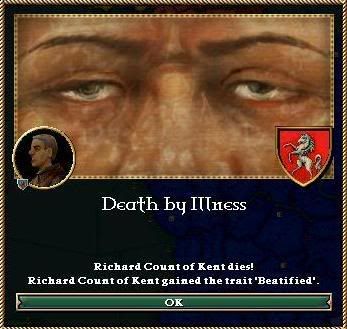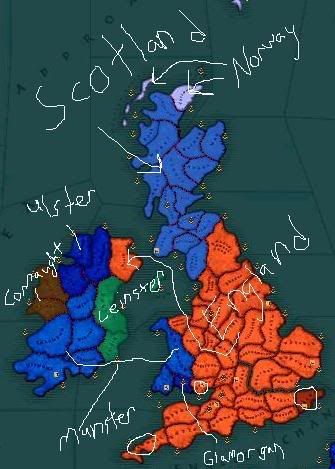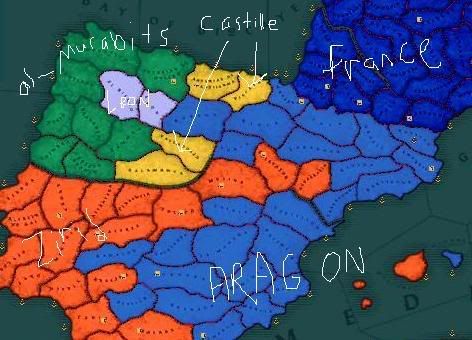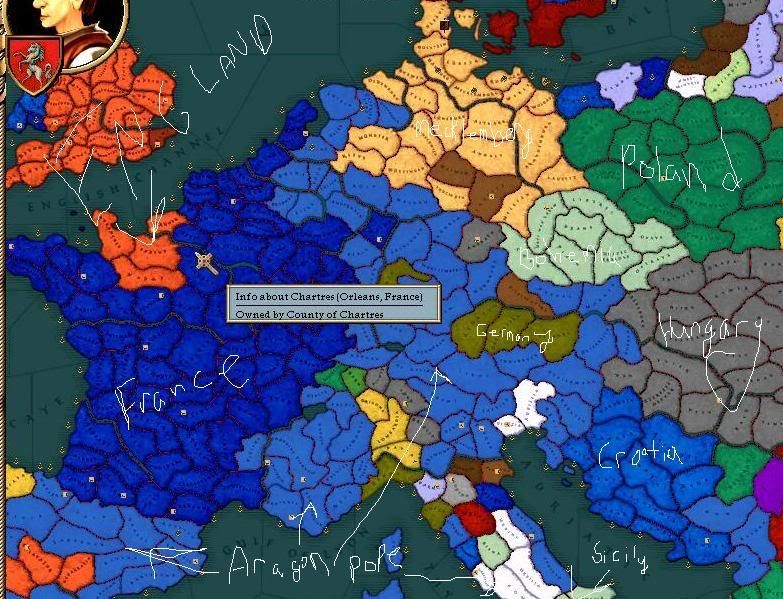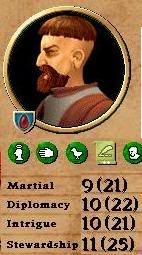Here Be Dragons...and the County of Kent
Odo de Conteville - Half-brother of King William de Normandie
1030 - 1093. Count of Kent 1066 - 1093
Count Odo spent most of his life worried that he would be remembered only as the son of the whore who gave birth to King William de Normandie, if at all. His mother's brief affair with a Duke, preceding her marriage to Odo's father, has of course had a far-greater direct impact on today's history books than Odo's own rule ever did.
However, the rule of Odo de Conteville should not be so quickly dismissed. Though he was merely a sufficient ruler...neither doing great good nor causing great harm...he is particularly interesting because of what we know of his wife and children.
Shortly after ascending to become the Count of Kent, Odo wed Clotilde di Valenti.
Clotilde gave birth to four children...a son Richard, followed by three daughters: Flandina, Judith, and (much later) Eremberga.
On the day Richard was born, Count Odo changed the land's succession rules to salic consanguinity, to ensure his strongest son would succeed him. As he ultimately only had one son, the effects of this decision would not be realized until long after Odo's death.
Much has been written of Clotilde's possible infidelities with Odo's marshal, a 16-year-old boy known only as "Gerard". Odo himself reportedly had his suspicions, especially given his distrust of women given the infidelity of his mother...but as his wife was far more sneaky than he could ever be, and was in fact in charge of the county's limited spy network, he was never able to tell whether these affairs actually took place. Though one might today question whether each (or even one) of their four children were in fact the blood of Odo, these questions were not asked aloud at the time.
But while the marriage of Odo and Clotilde may appear interesting at first glance, it is his relationship with his daughters that provides the most interesting insight into the psyche of this Count.
It is rumored that at one festive gala, possibly even in front of the King, Odo's eldest daughter Flandina asked her father (in a very public matter) where babies came from. While most of the adults present merely chuckled at the question, Odo reportedly wildly over-reacted...either merely slapping or actually beating the girl, depending on which report we believe.
Shortly after this, Flandina became very ill.
While we now believe her illness was in fact pneumonia, Odo believed it to be a curse from God for not cherishing his daughters. When his prayers did not heal Flandina's illness, he began showering all three of his daughters with toys and gifts and special attention. These purchases, along with repeatedly paying so-called miracle workers, soon had an effect on the county's coffers...which became even more painfully clear when Odo's skilled Steward passed away. Odo then hired a 17-year-old priest, Ralph de Turlane, to attempt to turn around the county's economic situation. While Ralph was able to plug the leak, he was unable to return the county to it's previously stable economic condition.
It should be mentioned as a side note that there are rumors of Clotilde having an affair with Ralph as well...in fact, they reportedly had a rather revealing (and public) falling out at a local tournament...but as all four of Odo's children had been born by the time Ralph appears in history, further pondering is not necessary.
Meanwhile, Odo's only son Richard had briefly been a dissapointment...prefering to read a book rather than practice his sword work or even chase after the maidens. However, once Richard came of age, he proved to be the savior the county needed. Odo made him Steward, and Richard quickly improved their financial standing to an even higher level than before Odo had spent it all on his daughters.
Odo then arranged Richard's marriage to Eremberga de Gael, the Duke of Norfolk's 16-year-old sister, who proved even better with a pocket-book than her new husband. Richard then became chancellor, handing off his previous role to his new wife.
Flandina eventually returned to health, and speaking of marriages, married Ulf Godwinson, a prestigious courtier in the Kingdom of Denmark.
Judith wed shortly after, to a very wealthy Frenchman.
King William (Odo's half-brother) had only recently declared peace with France, before his own death from a prolonged illness, at the age of 59. His son, Robert, apparently missed combat, and declared war with the Kingdom of Leon. Just months into his rule, however, he was slain in combat on the Iberian Peninsula, leaving the throne to his nine-year-old son Henry.
Henry attempted to continue the war in his father's name, but quickly called off this pointless battle.
Eremberga, Odo's final daughter, wed Rodrigo de Vivar, the marshal of the King of Castille...and Odo finally passed away shortly thereafter, in November of 1093, at the age of 63, after having been Count of Kent for 27 years.
Each of the children he spoiled so much rose to prominence:
Flandina became chancellor for the King of Denmark.
Eremberga followed in her mother's footsteps, becoming spymaster for the King of Castille.
And Judith actually became Countess of Pentievre, pledging allegiance to the French King.
But it was Odo's son, Richard, who became Count of Kent.
And so it is Richard that our story will focus on next.
FACTS
*Instituted Salic Consanginuity
*Credited for bringing the Slinged Javelin, Two-Field System, Annual Sailing, Iron-edged Plough, and the Short Sword to Kent due to his support of local scholars
*Built a Court of Justice, encouraged local fishing, and saw thousands of trees planted in Kent during his reign





